Recipe: $5.35 | Per Cup: $0.12 | Yield: 44 cups | Jump to Recipe
This seems silly: devoting a whole blog post to a simple vegetable broth. I mean, most people just grab a carton at the grocery store, or use whatever vegetable scraps they save in their freezer to make some at home.
It's not silly! Although I love the freezer bag of veggie scraps, I've learned that the most flavorful and nutrient-dense stocks incorporate whole vegetables as well. Yes, Ms. cheap-o, frugal, never-pays-for-broth me used two whole onions ($0.60), two pounds of carrots ($1), one pound of celery ($1), a whole sweet potato ($1.50), and half a bunch of parsley ($1) to make broth.
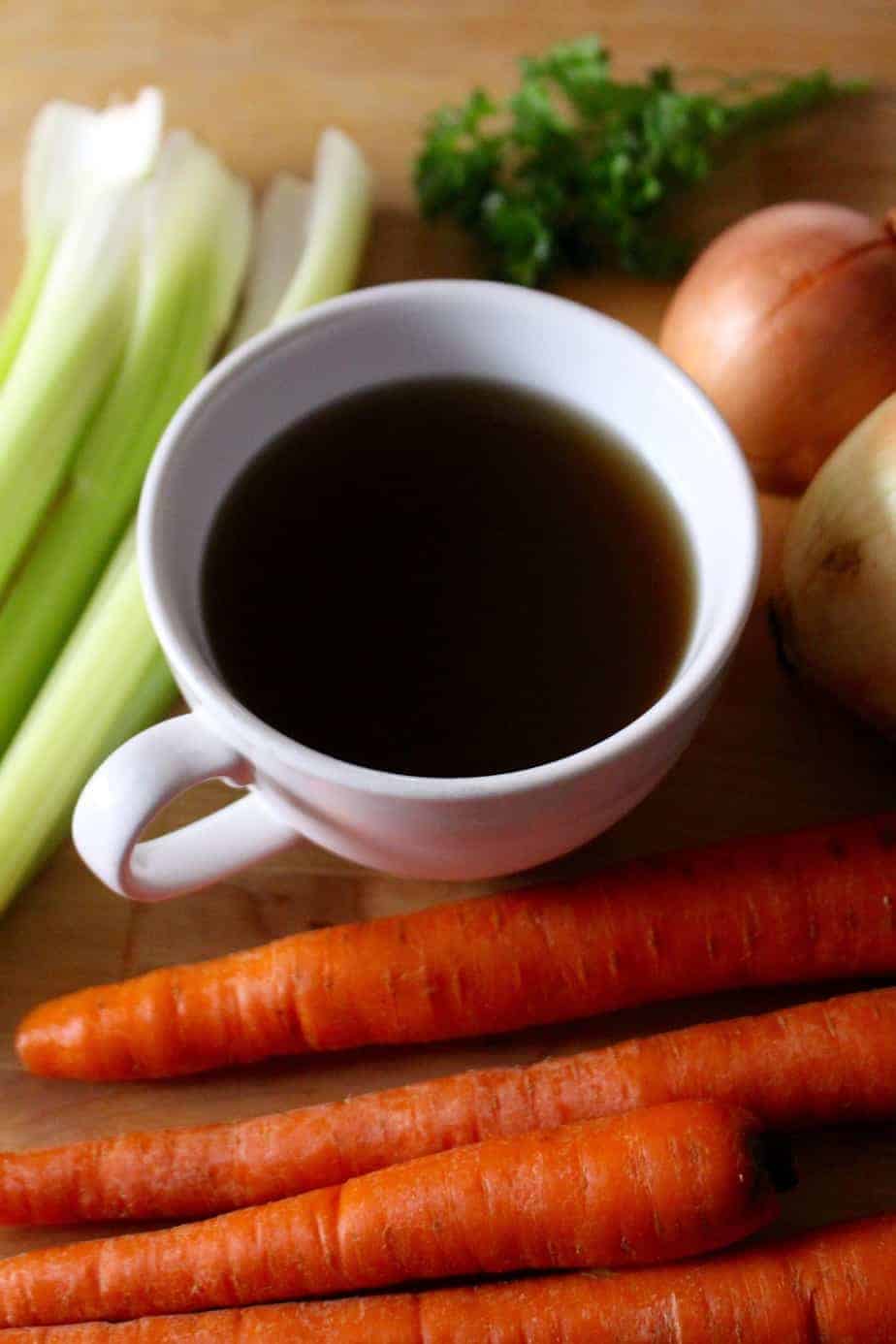
If you're anything like me, you've always viewed broth as an ingredient to add a little flavor oomph to your dishes, not as the end result. But now that I'm halfway through my MS in Nutrition, and about 42 hours' worth of Whole Foods Cooking Classes wiser...my perspective of broth has changed. I made beef broth with grass-fed beef bones from the farmer's market, chicken broth with 2 chicken carcasses and some chicken feet (yeeek), and now, a nourishing vegetable broth.
This recipe is based on Rebecca Katz's recipe for Nourishing Broth, which we make in our cooking classes, but I made it much cheaper by reducing the ingredient list to the more basic items that are easy to find in any grocery store. Including: SWEET POTATO. This is a game-changer for broth-making. Potatoes are a great source of potassium, so you can use any type of potato, but I went with the carotene-rich sweet potato for the nutrient density and sweeter taste. (Side note: tomato paste is also umami-rich and a delicious add-in!)
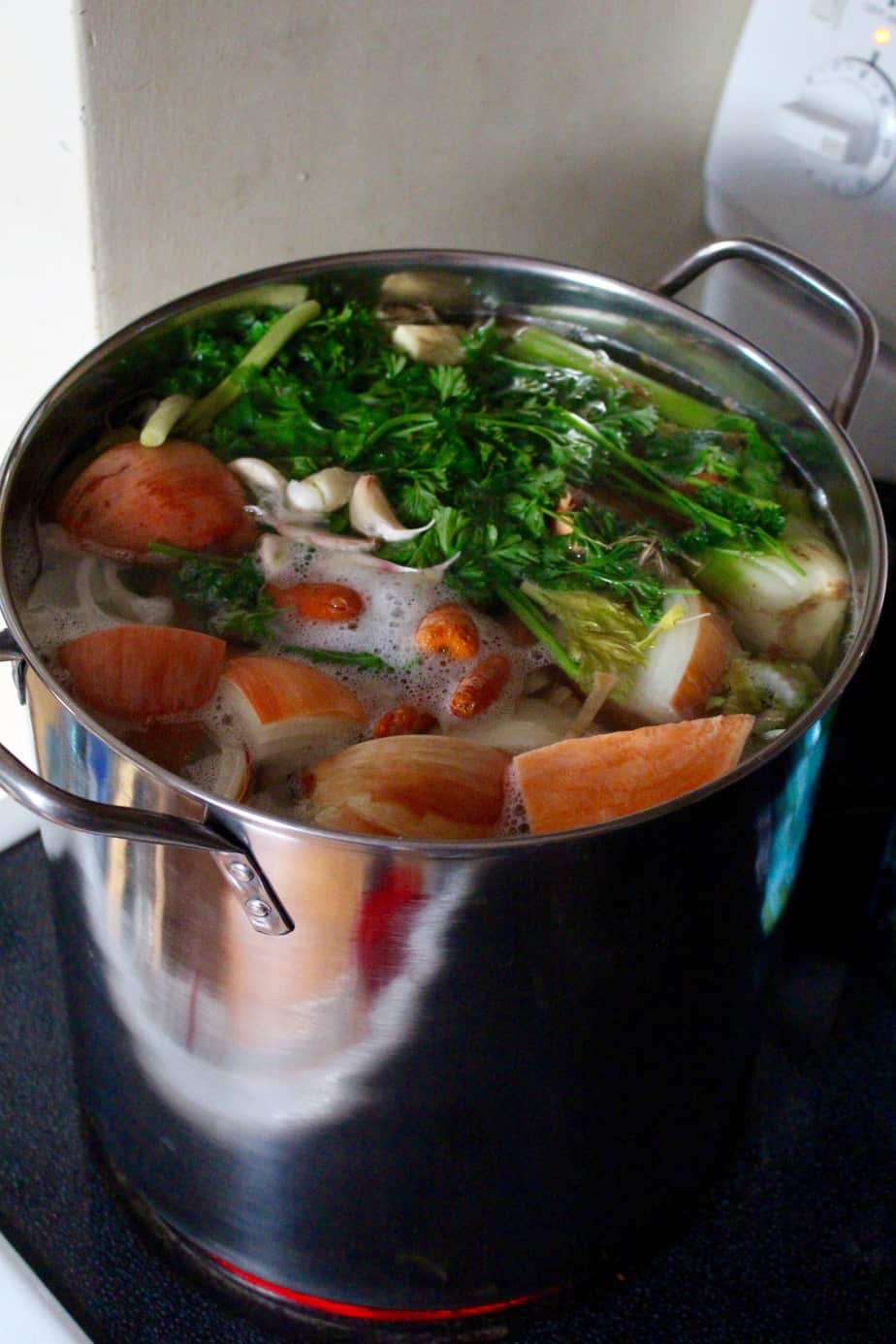
I also reduced the recipe, which still made a gigantic pot of this nourishing vegetable broth to kick off my week of VEGAN SOUPS. Yep, I've got a week of vegan soup recipes on deck for you guys that are pretty incredible. Using my newfound knowledge of broth, I've packed a lot of flavor into these soups and stews, and I just know you'll love them!
Here's a sneak peak at what I'll be posting this week.
A Week of Vegan Soups (& Stews): Gluten-Free, Dairy-Free, Vegan
- Lemony Lentil Stew
- Quinoa, Tomato, and Roasted Red Pepper Soup
- Carrot-Ginger Turmeric Soup
- Garlic Balsamic White Bean Soup w/ Spinach
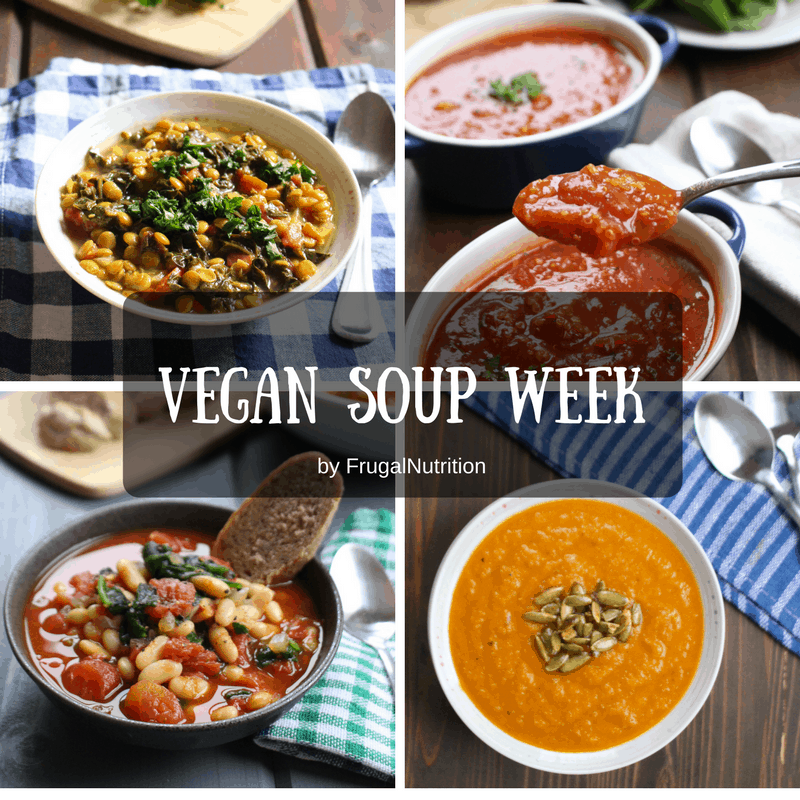
Stay tuned for those recipes! Now back to the broth - not only are they great for making soups, but also for sipping throughout the day. I have been reducing / almost eliminating caffeine from my diet because even though I would usually drink only 1-3 cups of green (sometimes black) tea each day, cutting that back to just 1 serving of tea (usually green or kombucha) has already significantly helped me sleep. I have a busy mind, so it can be pretty difficult to fall asleep, but since making this change in September I have only had 2 nights total in which I struggled to fall asleep. That's huge for someone who usually struggles at least once a week!
Reducing my artificial stimulation (caffeine) has helped me sleep deeper, feel more rested when I wake, and has reduced both my mild anxiety and cranky irritability. I used to have a lot more trouble sleeping back when I drank 3-5 cups of coffee each day and had terrible sleep hygiene habits, and I would also get sick at least every month. After 4-5 years of a coffee obsession, I cut it out cold turkey in 2010 (7 years ago!), and haven't looked back. Sometimes I'll get a decaf mocha during the holidays, but that's about it! Obviously, diets & lifestyles are not one-size-fits-all, but this has been a game changer for me, so if you're struggling with sleep, but your diet is pretty healthy, cutting back on caffeine is worth a shot. :)
Now get ye some nourishing broth...fer yer health!
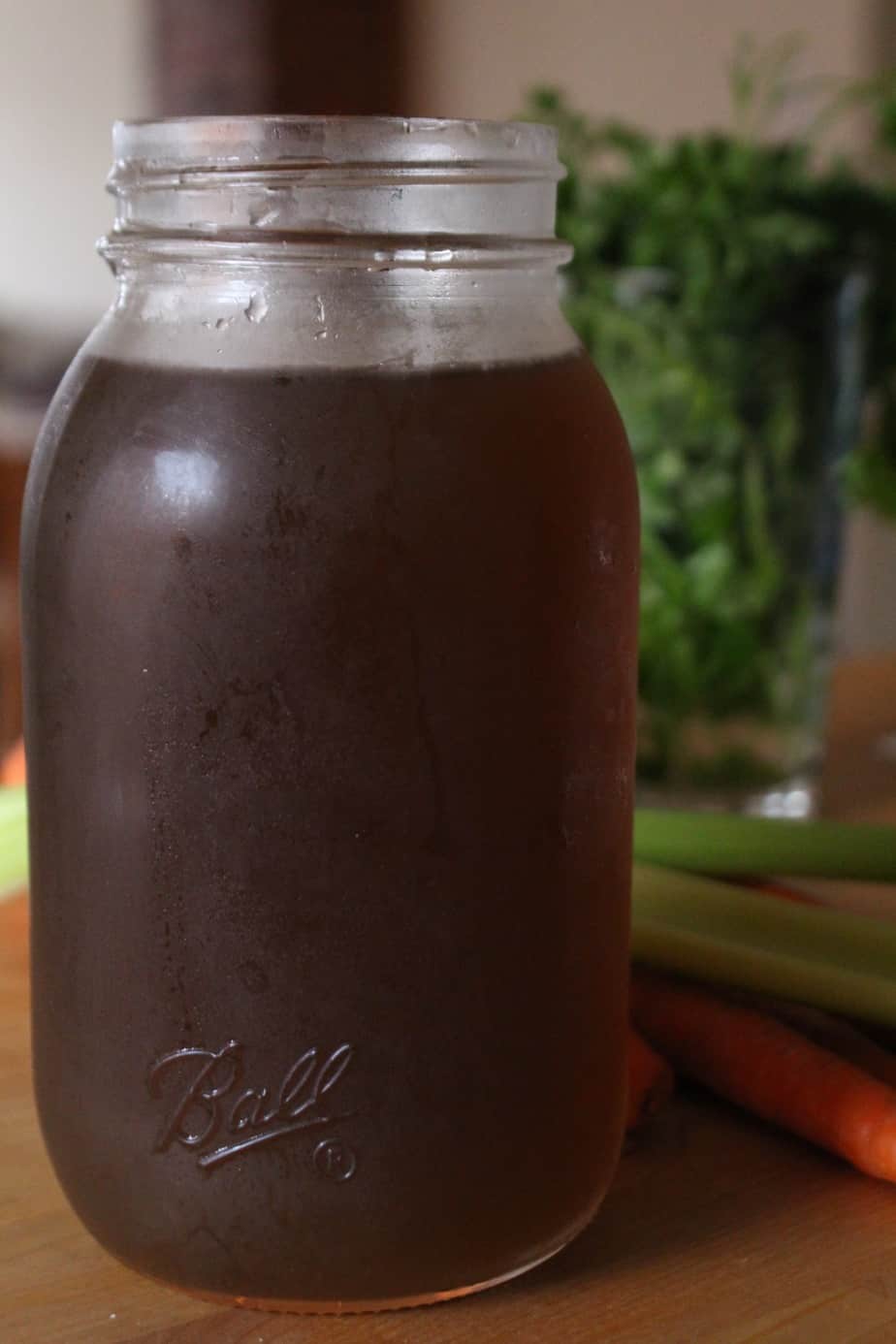
Vegetarian: Yep
Paleo: Yep
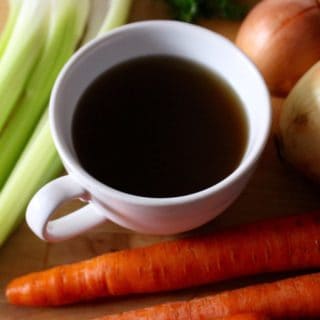
Homemade Nourishing Vegetable Broth
Equipment
- Stock Pot Large
Ingredients
- 2 pounds carrots unpeeled
- 1 pound celery unpeeled
- 1 large sweet potato unpeeled
- 4-5 cloves garlic unpeeled
- ½ bunch parsley
- Optional add-ins: whole black peppercorns kombu, leek, white or red potatoes, 1-4 tablespoon tomato paste
- 10-16 quarts water
Instructions
- Wash vegetables: Dump all veggies and herbs into a clean sink. Fill with water until vegetables are submerged and agitate well to remove dirt and debris. Pull apart the celery to remove dirt from between the stalks and shake the parsley in the water. You can also scrub the carrots and potato with a brush if desired.
- Quickly cut up ingredients: Cut carrots and celery into thirds, chop onions and sweet potato in half, in quarters, and then in eighths. Crush unpeeled garlic with the flat side of knife just to activate enzymes.
- Add all ingredients to a large stock pot - about 16 quarts or larger. Cover with water (I used 11 quarts of water, or 44 cups, plus an additional 4 cups when it evaporated a lot).
- Bring to a boil and skim off any white foam that forms. (If you want.)
- Reduce to a simmer and simmer over low heat for 2-4 hours. NOTE: I simmered for 2 hours, then I reduced my stove to the lowest setting and let it continue cooking overnight simply because of time constraints. I added 4 additional cups of water before bedtime to accommodate for this extra time.
- Strain out the vegetables and either discard, compost, or blend to mix into soups, baked goods, sauces, or purees. (These vegetables are basically just fiber without additional micronutrients.)
Notes
Nutrition
*There is no nutrition label for this broth because it is impossible to create one since all of the fiber and most of the calories are strained from the broth.
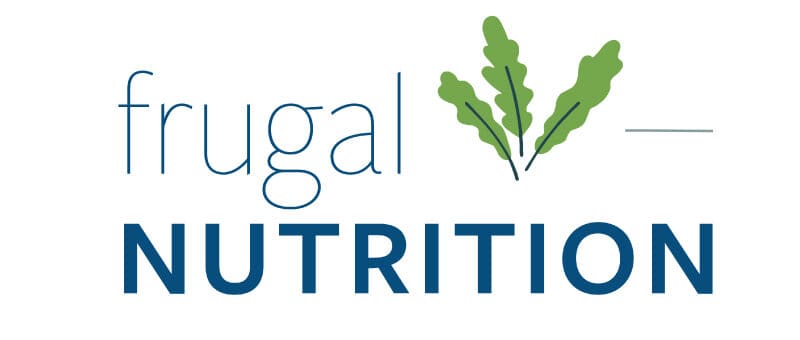

Love homemade broths!! What are your thoughts on cutting down the recipe even more and making in the crockpot? I like being able to set it on the counter for a day and not worrying about the gas stove being on.
Hey Kim!
I would say if you're making vegetable broth - go right ahead! I make it in my slow cooker all the time. When I make beef bone broths and stocks, I do much prefer the stove top method because I have better control over the temperature and end up with a better gelled broth. (Gelatin and collagen for the win!)